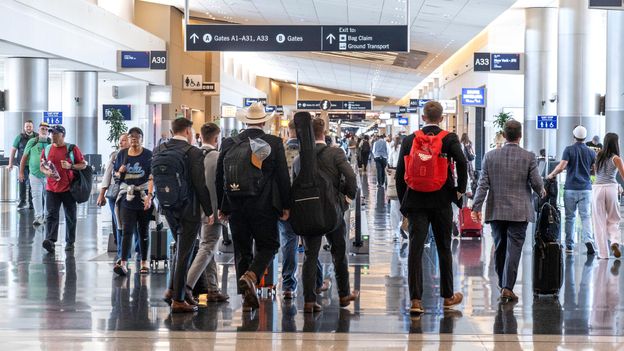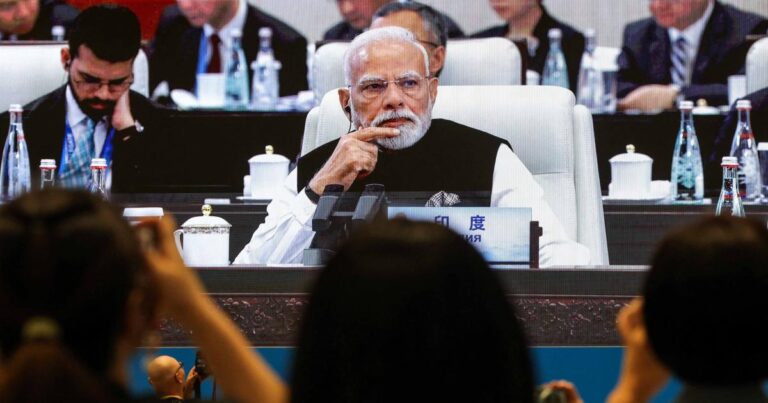As the US government shutdown takes effect, here’s what visitors need to know, from airport queues to national parks and museums.
From 1 October 2025, the US government is shut down after Congress failed to pass a funding bill. While essential services will continue, travellers are bracing for potential major disruption. From air travel to passport renewals and the shutdown of national parks and museums, travel to, through and out of the US may get much more complicated.
To understand how long a government shutdown might last and what could bring it to an end, read Anthony Zurcher’s analysis. The US Travel Association is also tracking the real-time economic impact of the shutdown, which it estimates to be about $1bn (£741m) per week for the travel economy and public.
Here’s what travellers need to know about air travel, possible delays and what remains open to visitors as the US government prepares to settle its budget.
Air travel
Commercial flights will continue to operate as normal and airline employees will not be impacted. The Transportation Security Agency (TSA) noted, however, that an extended shutdown could result in longer wait times at airports. Travellers should allow extra time for security screening and check flight status updates before heading to the airport.
Air-traffic control and the TSA both remain in operation, though workers will not be paid while the shutdown is in effect. According to a TSA spokesperson: “Approximately 61,000 of the agency’s 64,000 employees are considered excepted or exempt and TSA will continue operations to keep the travelling public safe.”
During the last government shutdown (which lasted more than a month from December 2018 to January 2019), TSA staff shortages led to significant disruption. Up to 10% of staff chose to stay home rather than work for free, affecting both domestic and international flights. During this period, union representatives for TSA employees said that many of the workers were likely seeking alternative temporary employment to make up for their lost wages. The New York Times reported that many, including Senator Bernie Sanders, credited air-traffic controllers for ending the previous shutdown after staffing issues created significant delays and a full ground stop at New York City’s LaGuardia Airport.
Train travel
Amtrak says its trains will continue to run as usual across the US and into Canada. Although it receives federal funding, Amtrak operates as a for-profit corporation and expects no immediate impact.
“Passengers planning to travel on Amtrak trains in the Northeast Corridor and across the country in the coming days and weeks can be assured that Amtrak will remain open for business,” Amtrak told ABC News.
Passports
Passports are the purview of the Department of State, which assures that “consular operations domestically and abroad will remain operational”. This includes passports, visas and assisting US citizens abroad. However, according to the Washington DC-based newspaper The Hill, processing times for passport renewals and issuances could impact processing times, so anyone planning to lodge a new application or renewal should allow extra time in addition to the usual four to six weeks.
New applications for passports, renewals and photo services are available on the United States Postal Service website and post offices remain operational as the USPS is an independent entity.
National parks
Parks will generally remain open, but visitors should expect fewer services, such as visitor centres being closed, and no maintenance along trails. More than half of national parks staff are furloughed.
During the last government shutdown, many parks were left open with just a skeleton staff, an occurrence that the National Parks Conservation Association (NPCA) urges the government not to repeat.
“Guidance shouldn’t direct park staff to swing the gates open and walk away,” Theresa Pierno, the NPCA’s President and CEO, said in a statement ahead of the shutdown. “We know what happened last time park staff were forced to leave parks open and unprotected, and the impacts were disastrous.” Since the shutdown went into effect, the conservationist group has urged visitors to stay away.
The National Parks Service (NPS) says that parks will remain “as accessible as possible” during the shutdown, noting that “park roads, lookouts, trails and open-air memorials will generally remain accessible to visitors”, although park websites and social media will not be maintained, except for emergency communications. It also notes that “critical functions that protect life, property and public health will remain in place, including visitor access in many locations, law enforcement and emergency response.” Travellers should check the Department of the Interior website for up-to-date information before heading out.
Museums
The Smithsonian Institution, which includes 21 museums and the National Zoo in and around Washington DC, will remain open until at least 6 October 2025, according to a notice on its website. The Smithsonian receives 62% of funding from the federal government and admission to its museums is free, but officials have not said what will happen if the shutdown extends beyond that date.
In a statement to the BBC, the National Zoo confirmed: “Like all Smithsonian museums, [the National Zoo] receives federal funding. Thus, during a government shutdown, the Zoo – and the rest of the Smithsonian museums – must close to the public.”
More like this:
• The perils of letting AI plan your next trip
• The seven travel trends that will shape 2025
• Why ‘best time to visit’ no longer applies
While this will disappoint visitors to the capital, the zoo’s representative assures that the animals will still receive full care. However, the popular animal webcam streams won’t be operating during the shutdown.
Outdoor attractions such as monuments on the National Mall will remain open, while Washington-area museums and sites that do not rely on federal funding – including the National Building Museum, the National Museum of Women in the Arts and the Phillips Collection – will also continue to operate.
Health and safety
Emergency services such as 911 dispatch will continue to operate as normal, and hospitals and medical centres remain open throughout the country. Veterans Affairs medical centres are also unaffected. Some services at US national parks may be scaled back with fewer staff and closed visitor centres, but emergency personnel will remain in place to keep visitors safe.
—
If you liked this story, sign up for The Essential List newsletter – a handpicked selection of features, videos and can’t-miss news, delivered to your inbox twice a week.
For more Travel stories from the BBC, follow us on Facebook and Instagram.












